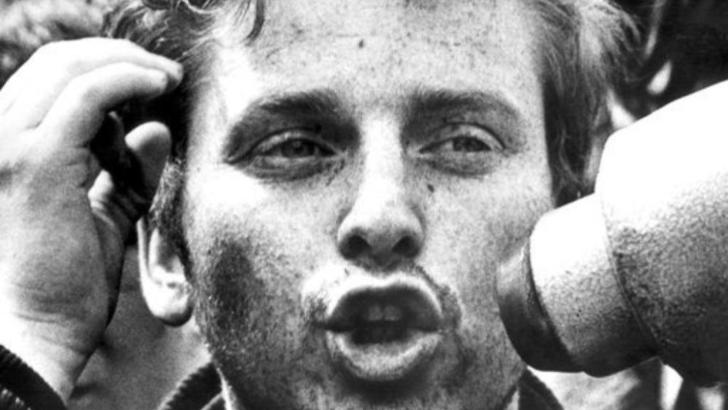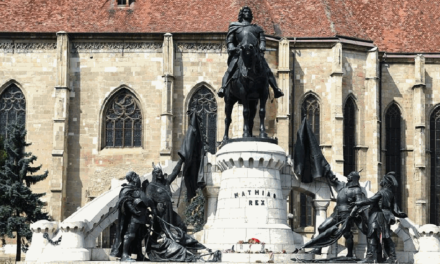They dared to be small: after a decade that is only described as "the politics of grandeur" in French history (la politique de la grandeur), 53 years ago, in the first days of May, the first clashes broke out in and around the Sorbonne University in Paris by protesting students and the police. The uprising of young people fueled by Marxist-Maoist ideas began, lacking any understandable goal, but very spectacular and causing extremely serious damage to the French economy.
On March 22, 1968, at the Nanterre (a suburb of Paris - ed.) faculty of the University of Paris, students voiced their dissatisfaction with the conditions of university education (overcrowded universities, lack of equipment, quality of education, placement problems, etc.) and occupied the university council room.
It was then that the March 22 movement was founded, which consciously organized smaller groups around itself. The leader of the group was Daniel Cohn-Bendit, whose parents were living in Germany at the time. Adhering to far-left ideals, Cohn-Bendit, who was called "Dany le rouge" or Red Dani not only because of the color of her hair, consciously organized student movements with political demands. For example, on May 2, 1968, they organized an anti-imperialist day at the University of Nanterre, and they also had protest movements against the Vietnam War.
Is it a coincidence that the strong coincidence between the official rhetoric of the Soviet Union and the states it occupied, which supports Western "anti-imperialist" movements, and the themes of the increasingly common far-left student demands and protests in France (anti-imperialism, Vietnam) , an unexplored area that remains a taboo subject to this day, just like Cohn-Bendit's later, active relationship with West German terrorist organizations.
Already since 1967, a recurring demand of the movements organized by Cohn-Bendit was the dismantling of the university regulations that corresponded to the civilized norms of the time.
According to them, it was not possible to leave the accommodation after 11 p.m., and boys and girls were not allowed to stay in each other's apartments. In April 1967, the girls' college was symbolically occupied. The building was taken back by the called police.
One year later, at the end of April 1968, the groups organized by the Cohn-Bendites in the name of sexual freedom again demanded easier access to the girls' dormitory and the rooms of the female students.
After the movements of the organized groups made education completely impossible, on May 2 the rector ordered the temporary closure of the Faculty of Humanities of the University of Nanterre and initiated disciplinary proceedings against eighteen students. Protesting against this, the students gathered the next day in the heart of Paris, in the courtyard of the world-famous Sorbonne University. Of course, Cohn-Bendit also moved its headquarters here. On May 3, four hundred students were forced out of the university by the police invading the Sorbonne. A mass fight then broke out in the surrounding streets, and the Sorbonne was closed.
On May 10, the students first held a sit-in strike, and then riots broke out at several other universities in Paris. Students erected barricades in the Quartier Latin. In the following days, serious clashes between protesters and the police took place in Paris and other universities, sometimes reaching the proportions of a civil war. Due to the brutal action of the police, the trade unions called for a 24-hour solidarity strike alongside the students on May 13.
A general strike movement developed. Nine million workers joined the movement: they occupied factories, the unions demanded higher wages, more social benefits and shorter working hours - on May 20, nearly five million French people went on strike. The goals of the two groups, students and workers, were different, so they also acted separately with their political demands.
Although even the most biased left-wing analysts admit that the revolution of 1968 cannot really be traced back to social reasons, they relatively rarely ask why this explosion occurred in a stable welfare society, in a state producing 5 percent economic growth. This can partly be explained on the basis of László Bogár's hypotheses.
While some analysts like to refer to a social crisis in connection with '68, the fact is that a crisis did not erupt then, but ten years earlier in May 1958: at that time, it was not the issue of the bedrooms of schoolgirls, but a political and military conflict that shook the country to its foundations that threatened the stability of France. After the coup in Algiers on May 13, 1958, the Fourth Republic with a parliamentary system collapsed, a state of emergency had to be introduced in the country; rebel army units occupied Corsica and prepared to seize power in the capital.
At that time, General Charles de Gaulle was "called back", who mastered the army's rebellion with skillful politicking. The general founded the Fifth Republic with a semi-presidential system, which still reigns to this day, "liberated" Algeria and oversaw the country's economic stabilization and then its rise. Within ten years, France became one of the most stable states with a growing economy in Europe.
However, in 1967, de Gaulle took a step that fits the catchphrase attributed – erroneously – to Talleyrand: "This is more than a crime, it's a mistake." Economist László Bogár at least sees connections between 1968 and the fact that a year earlier the general tried to convert France's respectable dollar surplus with the United States into gold again, referring to the agreement concluded in Bretton Woods in 1944.
Among the antecedents of the case was the fact that gold fled from Europe occupied by Hitler at breakneck speed to American vaults. In 1933, the United States had only fifteen percent of the world's monetary gold reserves, but in 1944 it had seventy-five percent. Thus, at the conference held in Bretton Woods, New Hampshire in 1944, America already dictated the terms, and the dollar became the absolute world currency.
For this very reason, the world's central banks did not feel the need to convert their dollar reserves into gold for a long time, since the dollar was literally worth gold to them. The situation changed radically by the end of the sixties. Europe (mainly France and Germany) and Japan became technological giants and ran huge trade surpluses with the United States. They accumulated such gigantic dollar reserves that from then on it seemed more expedient to exchange them for gold than in the United States. But only France led by De Gaulle dared to attempt this openly in 1967-68. The answer was not long in coming, in April 1968, the first "color revolution", the civil war called the Paris Spring, was launched!
It is a fact that following de Gaulle's request in 1967, France "exploded" in 1968.
After that, a wave of terror swept through the strong and prosperous Germany and Italy, shattering their economy and social stability, and all this culminated in the oil price explosion, which undermined Japan's strength and prosperity and deprived them of their gigantic dollar reserves.
In his TV speech on May 24, the President of the Republic Charles de Gaulle promised comprehensive social reforms on behalf of the government and the reorganization of university relations. Cohn-Bendit was expelled the same day. As a sign of their protest, the students set fire to the stock exchange as a "temple of capitalism". On May 27, the government and the unions agreed on a wage increase and the gradual introduction of a 40-hour work week. On May 30, General de Gaulle, with the army behind him, rejected demands for his resignation, dissolved parliament and called new elections for June, in which the Gaullists won an absolute majority. However, the events of May strongly shook de Gaulle's authority, and social tensions did not disappear, so in 1969, de Gaulle resigned.
The burning of the Quartier Latin and the stock exchange palace, the seven dead and the 2,000 wounded (of which we can speak of about 200 seriously wounded), the incalculable material damage, for example the huge amount of burned cars, and the decline in the growth of the French economy are not the responsibility of Cohn-Bendit or others. no one has held him accountable since 1968.
Cohn-Bendit in the European Parliament./Source: Magyar Nemzet
Moreover, in the European Parliament, he was always the leader of attacks on Christian-conservative Hungary.
Nothing new under the sun! The students of SZFE could take a good example from the spring student rebellion 53 years ago. Maybe just when we were trying to top up our wasted gold reserves?!
But the Hungarian people did not accept this attempt! The imported autumn seed did not bloom! The Hungarian spring belongs to the peaceful Hungarians!
Source: hirado.hu













